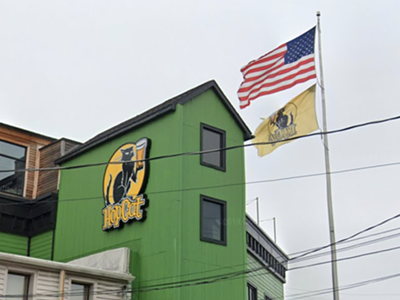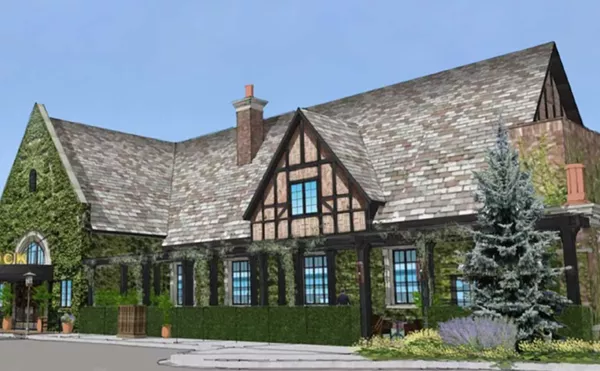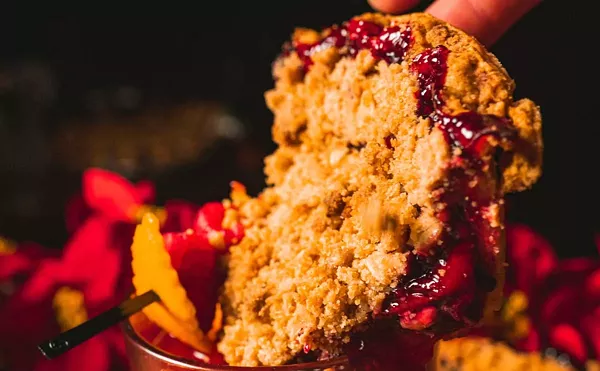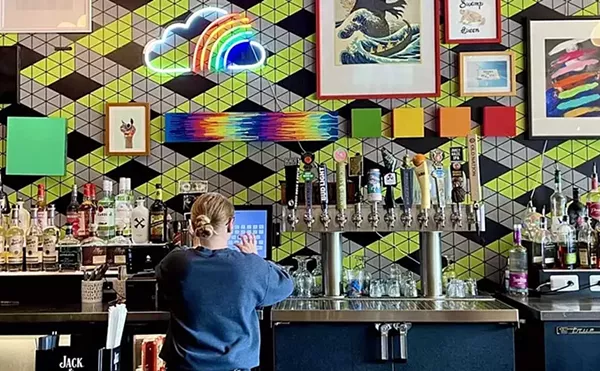Detroit bees helped make this honey-infused bourbon and barrel-aged honey
Bees in the D and Detroit City Distillery are getting ready to drop their annual limited-edition collaboration

Audio By Carbonatix
[
{
"name": "GPT - Leaderboard - Inline - Content",
"component": "35519556",
"insertPoint": "5th",
"startingPoint": "3",
"requiredCountToDisplay": "3",
"maxInsertions": 100,
"adList": [
{
"adPreset": "LeaderboardInline"
}
]
}
]
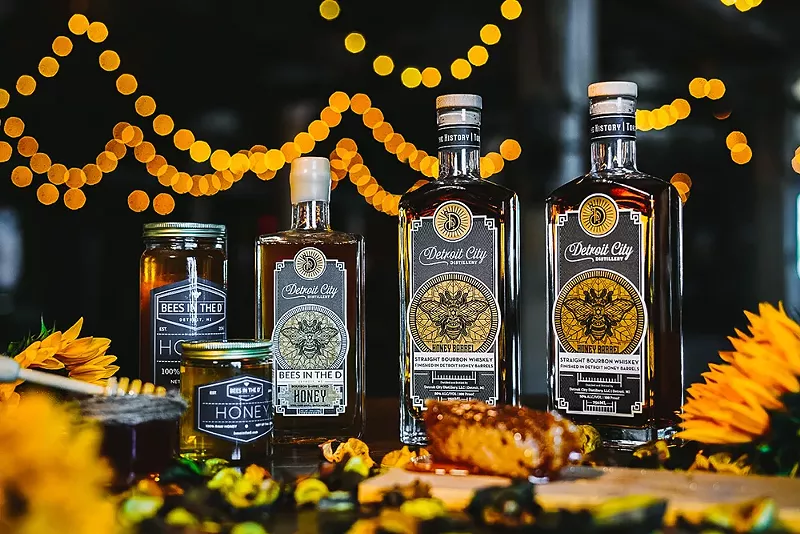
All summer long, buzzing bees have kept busy, collecting nectar from flowers to make sweet honey in their beehives. And now, it’s time to enjoy the fruits of their labor.
Bees in the D is a Detroit-based beekeeping nonprofit that manages more than 200 honeybee hives in and around the city, including on the rooftop of Detroit City Distillery’s Eastern Market facility. For the past four years, the two groups have collaborated each autumn to make limited-edition bottles of bourbon barrel-aged honey and honey-infused bourbon.
“We take 55 gallons of honey, and we barrel-age it in one of their bourbon barrels for 90 days, and then we empty the barrel and they put the bourbon in it, and it takes on that honey finish,” Bees in the D co-founder Brian Roest-Peterson tells Metro Times. “It takes on the flavor of the residual whiskey that’s in the barrel, as well as the wonderful flavors of being inside them.”
He adds, “It’s this wonderful candy flavor, and it’s just amazing.”
Only about 500 bottles are made, and the products are very popular. The honey ($40 per bottle) typically sells out within hours, while the bourbon ($60 per bottle) is expected to sell out by the end of the week, Roest-Peterson says.
Both items will be available for online purchase starting at 8 a.m. on Friday, Nov. 11 at detroitcitydistillery.com/shop, with pick-ups available at a launch party starting at 4 p.m. at Detroit City Distillery’s tasting room at at 2462 Riopelle St. A limited number of bottles will also be available at local liquor stores and Meijer grocery stores, Roest-Peterson says.
Bees in the D has beehives at about 70 locations across five counties in southeast Michigan. The hives are managed by Roest-Peterson’s partner in business and life, beekeeper Brian Peterson-Roest, who says that honey will taste different from one hive to the other, due to the different types of flowers available to the bees.
“It actually does have a very wide array of flavors, which is the fun aspect of it,” he says. “But also the time of year is a factor. Honey in one location in the spring is going to taste different than the honey that we get from that exact same location at the end of summer.” Each bottle of honey has a code on it, which can be cross-referenced on beesinthed.com to see exactly where it came from.
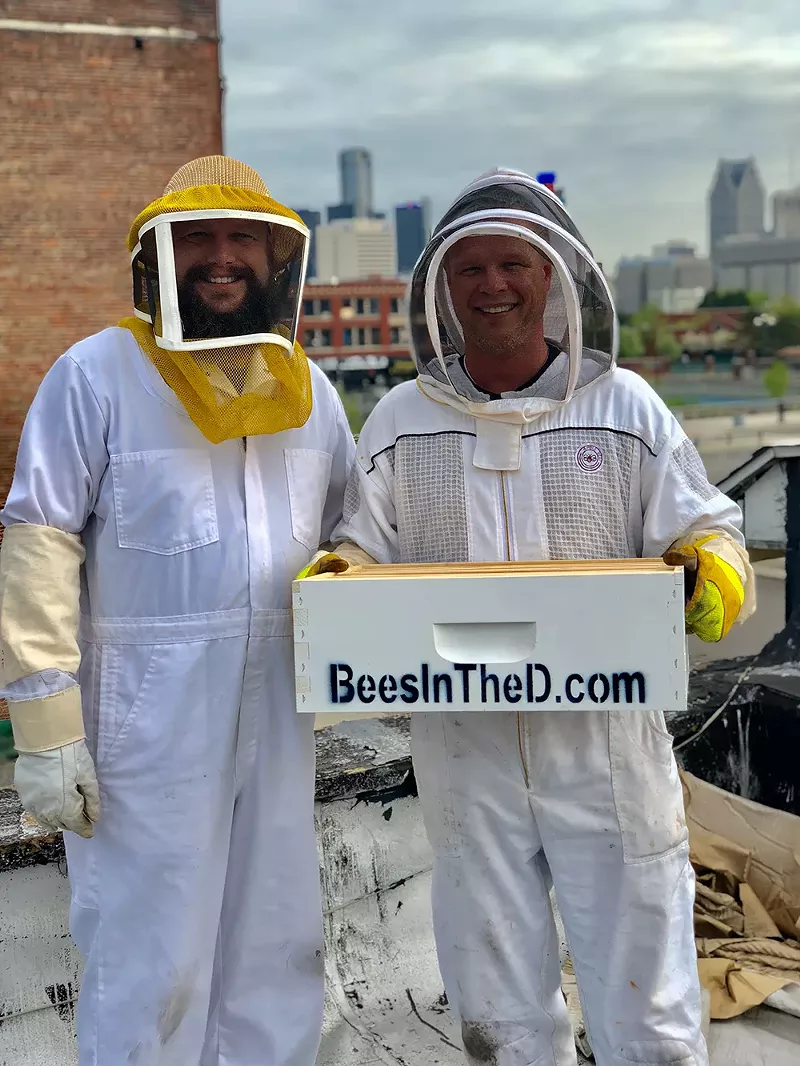
Peterson-Roest started beekeeping as a hobbyist in 2010, and formed the nonprofit to help bee populations, which have been declining for decades.
“Unfortunately, with so many different factors — like pesticides, there’s a lot more diseases, climate change, loss of habitat — it’s just more and more things are stacking up against the odds for all our pollinators, like butterflies and bees,” he says.
Bees in the D provides shelters for the bee colonies, and routinely checks in on them to make sure they’re healthy. They also work with local gardens and farms to distribute seeds and educate people about the importance of planting pollinator-friendly plants.
“They are at the base of the food pyramid in our ecosystem,” he says. “But what’s cool about Detroit, too, is we’re in so many urban gardens, that it helps the production of the gardens, and that food also goes back to the communities. So we’re also not only helping the ecosystem for the wild animals, we’re helping to feed the residents of Detroit.”
As for the bees, Peterson-Roest says in the cold months, they form what’s called a winter cluster, surrounding their queen bee and vibrating their muscles to keep her warm. “It’s like a giant bee hug,” he says.
The cluster will move around the hive, with the bees eating the honey they’ve stored to sustain themselves throughout the winter. For that reason, Bees in the D leaves about 80 to 100 pounds of honey in each hive so the bees have plenty for themselves.
The health of the bees is the most important thing, he says.
“If they do produce extra, that’s where we get to go in and harvest and we can enjoy their labor as well,” he says, “by putting it on our biscuits or whatever.”
Stay connected with Detroit Metro Times. Subscribe to our newsletters, and follow us on Google News, Apple News, Twitter, Facebook, Instagram, Reddit, or TikTok.


